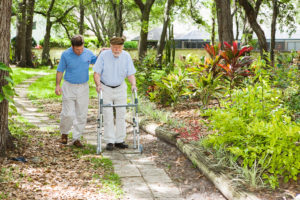Live 24/7 Call Answering: 609-881-1400
 Many of our cases involve serious injuries and deaths that result from falls. A lot of times families are just told that “falls happen” and that they are unavoidable. In our experience, this is simply not true.
Many of our cases involve serious injuries and deaths that result from falls. A lot of times families are just told that “falls happen” and that they are unavoidable. In our experience, this is simply not true.
To begin, nursing homes must be vigilant about falls because falls for the elderly can be catastrophic. The mortality rate for the elderly suffering a fall far exceed that for the young. Not only are bones more brittle in the elderly, but their reflexes are slower and often they cannot stop the fall with their hands. Many of the elderly that suffer falls fracture their hips, and the road to recovery is simply too difficult. Other times, after a fall a person suffers bleeding in the brain, which can be made worse if they are on a blood thinner. This often causes death.
All these dangers and the potentially catastrophic consequences are well known to nursing home companies. Nationally, falls are the number one reason the elderly are admitted to emergency rooms, and fall prevention is specifically addressed in Federal nursing home regulations. In fact, all residents must get a fall risk assessment upon admission. Factors to consider include medications, if the person needs a walker or cane, incontinence, and if there’s dementia or Alzheimer’s.
A person’s cognitive status – primarily if they suffer from dementia and Alzheimer’s – is very important. In some nursing homes, the main intervention is for “cueing”. This is where staff simply remind the resident to remember to use the call bell to ask for help if they need to go to the bathroom or move about. This intervention is meaningless if a person suffers from dementia or Alzheimer’s because the resident has little to no short-term memory, and will immediately forget the instruction. These people may be in grave danger.
Once a person is identified as a fall risk, there are lots of options available. Many interventions are common sense, like placing a bed against the wall or simply lowering the bed to the lowest position. Lowering a bed close to the floor shortens the distance if there is a fall, but it also reminds a person with cognitive or memory problems to ask for help by using the call bell because getting up out of bed may be difficult if the bed is lowered. Another commonsense fall prevention measure is to make sure people have the right shoes on, or if they’re in a wheelchair make sure they have a self-releasing seatbelt.
There are also more sophisticated interventions. Simple alarms that sound when a person is getting out of bed to notify the staff to assist can be effective. Newer versions of these alarms record a family member’s voice telling mom or dad to sit down and ask for help. Additionally, a simple floor mat next to the bed can soften a fall.
One of the simplest, but in many cases most important interventions, is making sure residents are getting to the bathroom. In our experience, most fall cases occur when a person needs to go to the bathroom and they get up to go without asking for assistance. CNAs need to anticipate the needs of their residents and make sure they get them to the bathroom frequently enough with assistance.

In order to keep your loved one safe, review the fall risk assessment at the care planning meeting and make sure the interventions prescribed make sense and actually work. Ask about staffing levels and be certain they are anticipating your resident’s needs and can respond to call bell lights. Call bells should be responded to in terms of minutes. In this way, you will be an informed advocate for your resident and will reduce the risk of falls.
For more information, call our nursing home abuse lawyers in New Jersey at Davis & Brusca at 609-786-2540 or contact us online.